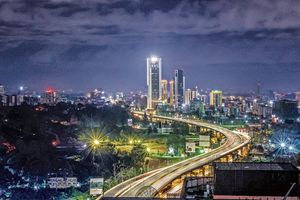
Charles Mwangi during the interview along Kimathi Street in Nairobi.
Charles Mwangi is not your ordinary Nairobian.
Unlike ordinary city dwellers, he has brought up a family largely by helping motorists park in the central business district, and his last born is sitting for national exams in a few days.
For the 62-year-old, being a parking boy isn’t just a job — it’s a lifeline, a thread that has held his family together for as long as he can remember.
Since 2003, he’s spent every day along Dedan Kimathi Street, guiding motorists into tight parking spots, rain or shine.

Charles Mwangi directs a motorist out of a parking lot along Kimathi Street in Nairobi on August 22, 2024.
A father of seven, Mwangi has sacrificed and struggled, relying on this humble work to put food on the table and give his children a chance at a better life.
As his youngest child prepares for final exams next year, Mwangi carries the weight of their future on his weary shoulders, knowing that every day on the street is a day closer to seeing his dreams for them fulfilled.
“I start my job early in the morning, and on a good day, I might make between Sh50 and Sh200. Even though this work has its ups and downs, it has provided for us through the years. But make no mistake, this life is full of struggles,” he says.

Charles Mwangi during the interview along Kimathi Street in Nairobi.
Mwangi is among hundreds of thousands, if not millions, of Nairobians who, without formal and regular employment, eke out a living through creative and ingenious ways.
They embody the sheer resilience of human spirit in the face of daunting economic and financial challenges that Nairobi, ranked one of the most expensive cities in the world, presents to ordinary Kenyans craving city life.
In Nairobi, it's a dance of give and take. The city’s relentless pace and unforgiving nature create an environment where only the most determined can thrive.
Whether it's scraping for rent or finding fare for the daily commute, Nairobi tests its residents at every turn.
Yet, amid the struggle, there's an undeniable rhythm—a hustle that keeps the city alive and its people moving forward, one day at a time.
In the hustle of Nairobi’s CBD, parking boys like Mwangi work in an informal arrangement with rogue city inspectorate officers managing parking spaces.
Many car owners prefer this bribe-taking and bribe-giving option, as they find it more convenient and affordable than paying through official channels.

Charles Mwangi directs motorists out of a parking lot along Kimathi Street in Nairobi on August 22, 2024.
Over time, trust grows, and some motorists even hand over their car keys to him, confident that he’ll keep their vehicles safe as they avoid being clamped by the authorities.
“We sometimes bear the wrath of the police,” Mwangi says, the pain evident in his eyes.
“To them, we’re just a nuisance on the streets. And with no formal agreements, it’s always a challenge dealing with new motorists who don’t understand how we operate.”
Then, there is Eric Inko.
When he first arrived in Nairobi from the serene hills of Taita Taveta, the city greeted him with a whirlwind of noise, traffic, and unrelenting energy.
Armed with little more than determination and a dream to carve out a better life, he quickly learned that Nairobi doesn't offer second chances to those who falter.
Inko’s initiation into the city’s grind was swift and unforgiving. He found himself navigating the muddle of Nairobi’s bustling streets, where opportunity mingles with adversity at every corner.
With no formal job and no one to rely on, Inko turned to the one skill he knew could keep him afloat — street vending.
What started as a small venture selling boiled eggs soon evolved into something bigger. He added sausages to his offerings, earning him the street nickname "smocha pasua guy."

Eric Inko, a street food vendor, attends to a customer along Tom Mboya Street in Nairobi on August 21, 2024.
But Nairobi, with all its promises, is a double-edged sword.
For every good day that brought in Sh700, there were days when Inko’s income pendulum swung into the negative.
These were the days when the city's harsh realities hit hardest—when rent, food, and the dream of sending money back home to his parents seemed like distant, unattainable goals.
Yet, Inko persisted.
The evening rush hour, with its endless lines of frustrated commuters, became his prime time.
As Nairobi’s notorious traffic ground to a halt, Inko would weave through the queues, his snacks offering a brief respite to the weary travelers. It’s a simple hustle, but in Nairobi, nothing is ever simple.
“I've learned to survive in Nairobi, where life isn't easy for anyone,” Inko reflects.

Eric Inko, a street food vendor, serves a customer along Tom Mboya Street in Nairobi on August 21, 2024.
His words carry the weight of someone who has been tested by the city’s trials but refuses to give in.
"On a good day, I can take home around Sh700, but on tougher days, it’s closer to Sh400. Over the course of a month, I earn a maximum of Sh21,000,” he says.
“Out of that, I spend between Sh4,000 and Sh5,000 on rent, water, and electricity. I also send some money to my parents. I need to eat, so I have to buy food for myself. Since I live not far away, I only spend about Sh100 on fare. I try to save a bit of the remaining money as well.”
His early encounters with the city’s inspectorate marshals taught him the art of evasion—a skill as essential as any in the urban jungle.
The constant cat-and-mouse games with the 'kanjos' has become part of his daily routine, a reminder that in Nairobi, survival is not just about hard work, but also about staying one step ahead.
“2024 has been incredibly tough. We used to open our business in the afternoon, but now we have to wait until evening because of the constant harassment from the kanjos. It's heartbreaking, and that’s why we’re struggling to make ends meet. Before, the money was better, and I could take care of my siblings without worrying as much. But now, every day feels like a battle for survival,” he says.
A majority of Nairobians rely on informal employment to make ends meet. From street vendors to small-scale artisans, these individuals contribute significantly to the city's economy while grappling with the challenges of irregular income and job insecurity.
A 2023 Oxfam report showed that the four wealthiest Kenyans have more wealth than 22 million poor Kenyans.
These top individuals hold a combined wealth of Sh333 billion, highlighting the extreme inequality in the country.
The poverty rate ($2.15 international poverty rate) according to the World Bank is projected to have declined from 35.8 percent in 2022 to 35.1 percent in 2023.
The world poverty clock puts the figure at 27 percent in 2024— meaning 14.2 million people are currently living in extreme poverty in Kenya.
While the majority are in rural areas, 14 percent of the extreme poor are living in urban areas, mainly in Nairobi.
There were approximately 2.5 million slum dwellers in about 200 settlements in the Kenyan capital, representing 60 percent of the Nairobi population and occupying just 6 per cent of the land, according to the 2019 census.
Jemimah Masengeli, a mother of two, has been living in Nairobi for the past nine years. For her, Nairobi is a city where one must hustle relentlessly.
She works as a "mama fua" (laundry woman), earning between Sh500 and Sh1,000 per day.
Her monthly income totals about Sh15,000, which she carefully divides between paying her Sh5,500 rent and providing for her children and food.
Data from HassConsult shows that the average rent for a 1-3 bedroom property in Nairobi’s suburbs is currently Sh93,851.
On the other hand, a 2018 study showed that the average rent for slum dwellers in Nairobi is Sh3,072.
“Hii ni (This is) town, you have to know how to survive and plan well, every day is a challenge, but I’ve learned to navigate it with determination and careful budgeting,” she says.
“I’ve created a budget to manage my expenses and take on various odd jobs to supplement our daily income. From what I earn, I set aside something small each day for my children’s education. It’s a constant balancing act, but I’m committed to providing them with a better future and there is no way I am going back to the countryside, there is no choice but to survive.”
For many, the struggle to find affordable housing close to their workplaces is a daily challenge, requiring them to weigh the benefits of convenience against the costs of higher rent.
In the concrete jungle that makes Nairobi what it is, it is not just the skyscrapers that define the skyline—it’s the dreams of those like Mwangi, Inko, Masengeli, and Omollo who, despite the odds, push forward.
Because for many like them, survival is never guaranteed — yet, it’s the only choice.










